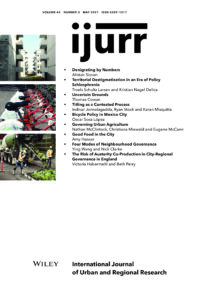This article examines the effect of the development of bicycle policy in Mexico City on existing landscapes of urban citizenship. In Mexico City, NGOs, activists and progressive city officials used Ecobici, the city’s bike share system, to promote the bicycle as an innovative, sustainable and socially inclusive mode of transportation in central areas of the city. At the same time, bicycle infrastructure has not yet reached peripheral, low‐income and underfunded districts, where residents rely on bicycles for transportation. I draw on the Cities and Low Carbon Transitions framework to examine bicycle policy as a project aimed at transforming Mexico City’s socio‐technical systems for transportation, and I draw on notions of urban citizenship to examine how green urban infrastructures materialize and transform regimes of inequality. The article shows how the bicycle experiment was limited by a consensus that maintained existing power inequalities, favored expert‐driven design targeting middle‐class users, and opted for rapid project implementation over long‐term institutional re‐design and capacity‐building. These dynamics excluded citizens from the planning of bicycle policy and the urban poor from enjoying the benefits of the investments.

